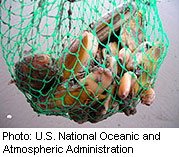
WEDNESDAY, March 27 (HealthDay News) — New England will have a moderate red tide this spring and summer, scientists predict.
Red tide is a harmful algae bloom. The algae in the water don’t pose a direct threat to people, but toxins produced by the algae can accumulate in mussels and clams and cause paralytic shellfish poisoning in people who eat them.
This year’s forecast is similar to the moderate red tide in 2012, said the scientists, who were funded by the U.S. National Oceanic and Atmospheric Administration. Red tide typically occurs along some portions of the Gulf of Maine coast.
“Red tide is a chronic problem throughout the Gulf of Maine, affecting commercial and recreational harvesting interests,” Chris Nash, shellfish program manager for the New Hampshire Department of Environmental Services, said in a Woods Hole Oceanographic Institution news release.
“State agencies are responsible for monitoring toxicity levels in shellfish harvest areas and implementing harvest closures when needed,” Nash said. “Ultimately our goals are to protect public health and give consumers confidence in the quality of the seafood products they purchase from markets and restaurants, and these forecasts are useful in realizing those goals.”
To protect public health, shellfish beds are closed when levels of toxins rise above a certain level. This often occurs during the peak harvesting season. But due to effective monitoring by state agencies, there have been no illnesses from legally harvested shellfish in recent years, even though there have been some severe red tides during that time, the researchers noted.
There have, however, been several reports of severe poisoning among people who ignored signs that shellfish beds had been closed, the forecast team added.
Their prediction for 2013 is based on the quantity of the algae Alexandrium fundyense in its dormant state detected in Gulf of Maine sediments last fall. This information was combined with a computer model to produce a range of bloom scenarios based on previous years’ conditions.
More information
The Massachusetts Department of Health and Human Services has more about red tide.

